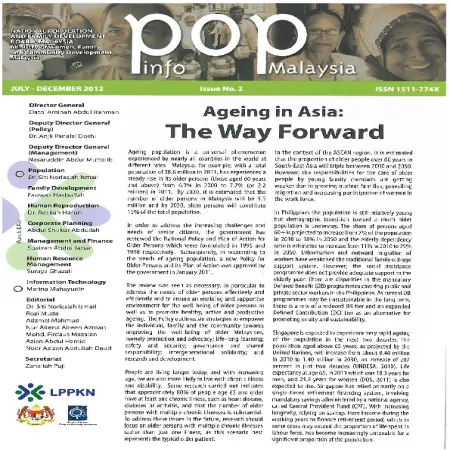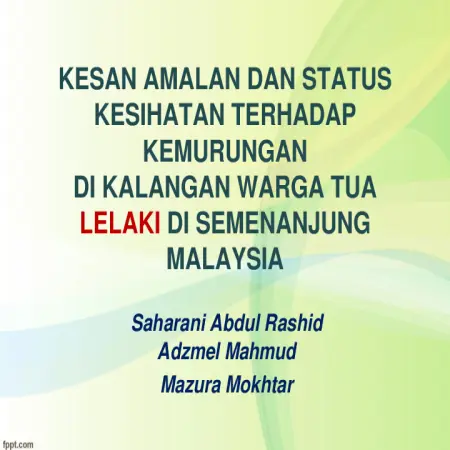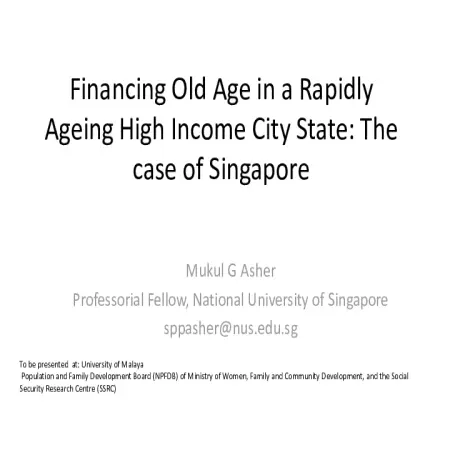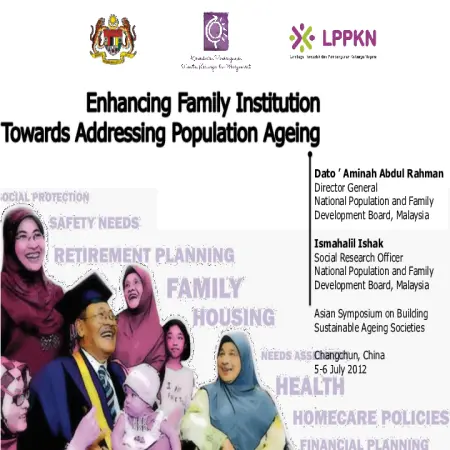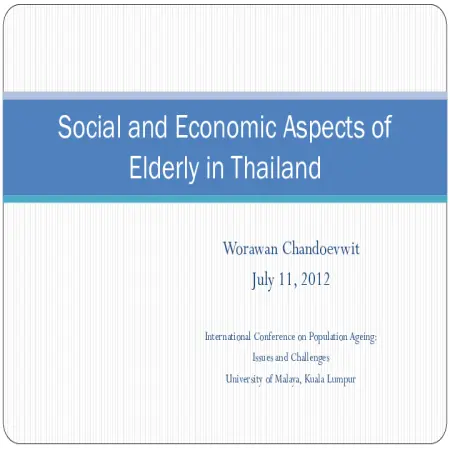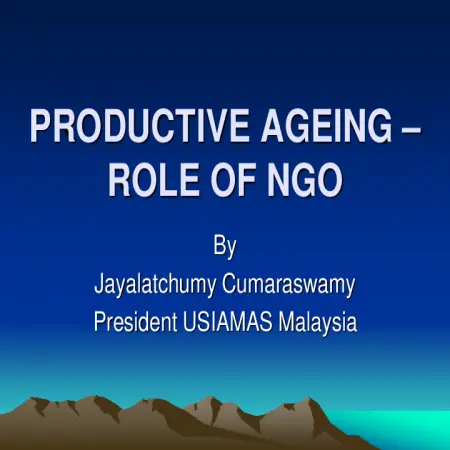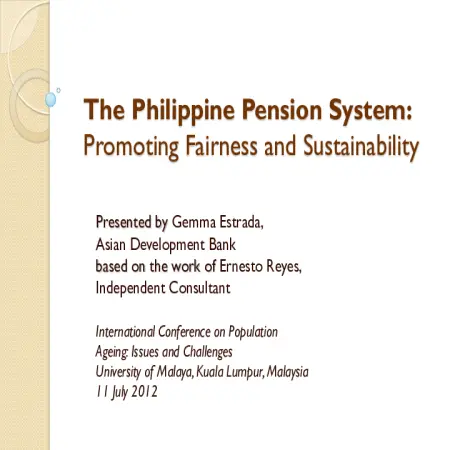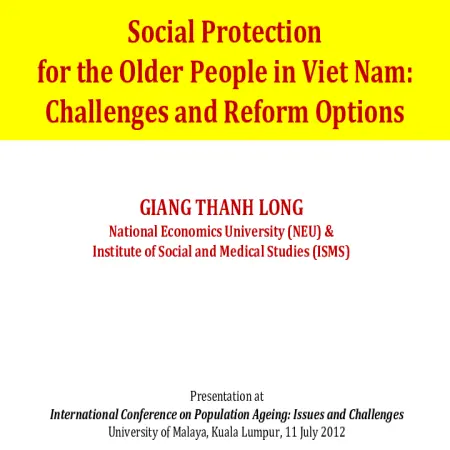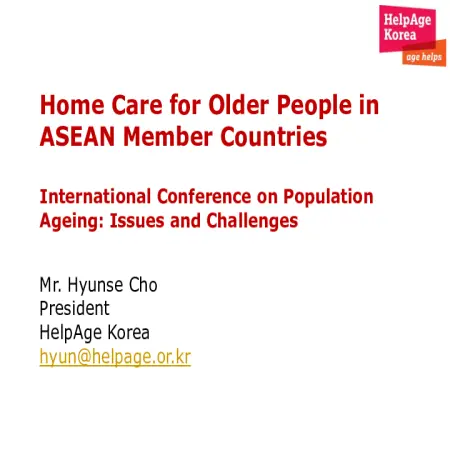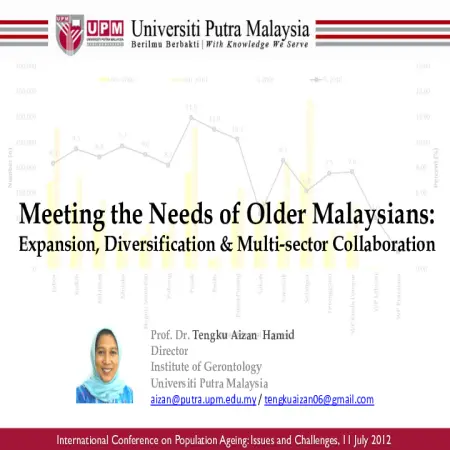TOPICS
Results for Topics : "Ageing"
|
|
Ageing in Asia: the way forward
Item Type: Newsletter
Editor:
Year: 00/12/2012
Abstract: Ageing population is a universal phenomenon experienced by nearly all countries in the world at different rates. Malaysia, for example with a total population of 28.6 million in 2011, has experienced a steady rise in its older persons (those aged 60 years and above) from 6.3 % in 2000 to 7.7 % (or 2.2 million) in 2011. By 2020, it is estimated that the number of older persons in Malaysia will be 5.5 million and by 2030, older persons will constitute 15 % of the total population.
|
|
|
|
|
|
Kesan amalan dan status kesihatan terhadap kemurungan di kalangan warga tua lelaki di Semenanjung Malaysia
Item Type: Conference or Workshop Item
Editor:
Year: 00/00/2012
Abstract: This study aims to look at the factors of practice and health status that contribute to depression among elderly men aged 60 years and above in Peninsular Malaysia. The data used in this study was obtained from the 4th Malaysian Population and Family Survey which was conducted by the National Population and Family Development Board (LPPKN). The data obtained were analyzed using Descriptive Statistics and Logistic Regression. Among the variables used were the level of health, frequency of treatment, disease, frequency of exercise and health check-ups. The results of the analysis showed that coronary heart disease, decreased labor capacity, restless inability to sleep and attending religious ceremonies were independent variables influencing the risk of depression.
|
|
|
|
|
|
Financing old age in a rapidly ageing high income city state: the case of Singapore
Item Type: Conference or Workshop Item
Editor:
Year: 00/00/2012
Abstract: Singapore, an affluent city state, is among the most rapidly ageing society globally. This is due to low fertility rate (TFR of 1.2 in 2011); and increasing life expectancy (18.3 years for men and 21.8 years for women at age 65 in 2011). Its support ratio (working age persons/elderly) is projected to decline from 7.9 in 2011 to 2.2 by 2030, representing a steep decline. It primarily relies on a mandatory savings tier to finance old age. This tier is administered by a statutory Board called Central Provident Fund (CPF) under the Ministry of Manpower. The CPF has over the years been used not just for retirement, but for housing health care, and other purposes. Its wide scope and mandate has resulted in considerable complexity. This paper provides an assessment of the extent to which the current old age financing arrangements are likely to address longevity, inflation, and survivors’ risks faced by individuals in their old age. Not only each person will need support for a longer period in old age, but societal and individual expectations about old age support are also changing, reflecting the affluent society.
|
|
|
|
|
|
Enhancing family institution towards addressing population ageing
Item Type: Conference or Workshop Item
Editor:
Year: 00/00/2012
Abstract: Malaysia will be aged by the year 2030. The objective of National Policy for Older Persons, 2011 is to enhance the respect for and self-worth of the elderly in family, society and nation at the same time to develop the potential of the elderly so that they remain active and productive in national development and to create opportunities for them to continue to live independently and to encourage the establishment and the provision of specific facilities to ensure the care and protection of the elderly. The areas of Plan of Action: Promotion and Advocacy, Lifelong Learning, Safety and Protection, Governance and Shared Reasonability, Involvement and Intergenerational Solidarity, Research and Development.
|
|
|
|
|
|
Social and economic aspects of elderly in Thailand
Item Type: Conference or Workshop Item
Editor:
Year: 00/00/2012
Abstract: Thailand is already an aging society. About 14% of population are elderly. Using a national survey, it can be shown that 16% of elderly households in the rural area have substandard living condition. The majority of elderly (60%) rely on remittance for their living. About 20% of elderly have to work for living and only 4% have government pension. Thailand is now organizing a National Saving Fund to promote saving for retirement. Another national survey finds that 80% of population want to save for their retirement but only 48% think that they can make regular monthly saving. This is consistent with another survey which finds that 50%-60% of elderly actually prepared themselves physically and mentally into the elder period. Elderly are less happy than the young. They are quite healthy, about 90% of those in the 65-74 age group can take care of themselves. It was quite normal in the Thai culture that children take care of their old parents. Above 80% of population expect that their children will take care of them physically, mentally, and financially when they become old. Taking care of old parents is something done by daughter. About 45% of elderly who are older than 94 years are taken care by daughter or daughter-in-law, another 38% take care of themselves. UN projects that Thailand will have 20 million elderly in the next 20 years which makes the elderly account for 26% of population or 45% of working age population. Without income security and long term care schemes for elderly, it would be very difficult for children to take care of their parents.
|
|
|
|
|
|
Productive aging - role of NGO
Item Type: Conference or Workshop Item
Editor:
Year: 00/00/2012
Abstract: Butler and Gleason (1985) define productive ageing as “the capacity of an individual or a population to serve in the paid workforce, to serve in volunteer activities, to assist in the family and to maintain himself or herself as independent as possible.” USIAMAS is a non-governmental organization (NGO), registered in 2002 with the Registrar of Societies. It is a non-profit and welfare related organization whose members are senior citizens themselves. USIAMAS was formed with the objectives of being a smart partner or consultant to government, corporate and other volunteer bodies who share the same mission and vision of planning, implementing, coordinating, evaluating policies, projects and programs for the wellbeing of senior citizens towards quality and meaningful life. Among the various programs run by USIAMAS to support productive ageing are seminars, capacity training programs for volunteers and with the cooperation of the Social Welfare Department of Malaysia manages an Activity Center for Senior Citizens in Kompleks Penyayang Sungai Buloh. USIAMAS was honored to be chosen by HELPAGE Korea to implement a pilot project on home-help in 2005. Home-help is a community support program aimed at ‘recruiting, developing and deploying volunteers to make regular visits as informal companions and soft-skilled caregivers to older persons staying in their homes.’The normal duties of a volunteer in a home-help program include ‘personal grooming, running errands, feeding, reminders on medication, writing letters, accompanying them on recreational activities, visit to hospitals, banks or supermarkets’ More often the mere art of listening and responding to the needs of older persons will help to overcome their feelings of ‘rejection, isolation, boredom and loneliness’. The pilot project which commenced in 2005 has now been extended to Negeri Sembilan and Melaka with the support of the Social Welfare Department of Malaysia.
|
|
|
|
|
|
The Philippine pension system: promoting fairness and sustainability
Item Type: Conference or Workshop Item
Editor:
Year: 00/00/2012
Abstract: This paper presentation about sharing knowledge on the retirement system in the Phillippines, currently characterized by a four-pillar structure. The first pillar refers to social assistance programs created to address the needs of the elderly poor. The second pillar covers the following mandatory defined-benefit programs: (i) the Social Security System (SSS) for private sector workers, (ii) the Government Service Insurance System (GSIS) for public sector workers, and (iii) the Armed Forces of the Philippines Retirement Service Benefit System for the military, which altogether cover about 79% of the labor force. The third pillar encompasses mandatory defined contribution programs, which can be further expanded. The fourth and final pillar covers voluntary pension programs, involving various forms of savings instrument. Because the pension system is fragmented, contributions and benefits vary depending on the program.
|
|
|
|
|
|
Social protection for the older people in Vietnam: challenges and reform options
Item Type: Conference or Workshop Item
Editor:
Year: 00/00/2012
Abstract: This paper aims to argue that the Vietnamese population has been aging more quickly than expected, and as such policies toward an aging population, particularly delivery of social protection services for the aged, should be well-prepared from now in order to have older and wealthier population in the coming decades. The paper shows that the social protection schemes in Viet Nam, especially pensions and social allowances, have expanded and reached various groups of old-age persons and played an important role in reducing old-age poverty. Yet, there have remained a number of challenges that will substantially influence the current system in term of financial sustainability and generational equity. For the pension scheme, the paper argues that the current setting will not be financially stable and generational equity and as such it should be transformed toward a new setting. For the social allowances, a universal cash transfer program for older people would be influential and cost-saving in terms of poverty reduction.
|
|
|
|
|
|
Home care for older people in ASEAN member countries
Item Type: Conference or Workshop Item
Editor:
Year: 00/00/2012
Abstract: It is estimated that population of over 60 years in the South-Asia will triple between 2000 and 2050. By 2050, one out of four older people will be over the age of 80. This causes a growing need for welfare and health services for older people. However, the traditional family support system is under pressure due to the trend towards nuclear families, prevailing migration of children and increasing participation of women in the workforce. In most developing countries, the lack of appropriate programmes, policies and financing places further strain on an already stressed family system. In order to meet the growing needs of “CARE” services for older people in the community, HelpAge Korea have implemented HOME CARE project under the ROK-ASEAN Cooperation Project, which provides basic social and health related care services for older people who are poor and having difficulties of ADL at their home by volunteers. The HOME CARE project has been implemented in collaboration with government, non-government organizations and community people in 10 ASEAN member countries for 9 years from April 2003 to May 2012. The presentation shares the outcomes of HOME CARE project that has been successfully conducted in terms of developing localized model, strengthening GO & NGO collaboration for the expansion and influencing GO to integrate HOME CARE into policy framework. HOME CARE is one of community based care system to reduce the burden of the society and to improve the quality of life of older people. However, in responding to the need of vulnerable older people, there is no single solution but a series of care system is necessary. The presentation shares the future plan of ROK-ASEAN Cooperation Project on COMMUNITY BASED SERVICES of HelpAge Korea.
|
|
|
|
|
|
Meeting the needs of older Malaysians: expansion, diversification, and multi-sector collaboration
Item Type: Conference or Workshop Item
Editor:
Year: 00/00/2012
Abstract: The older population in Malaysia grew from 0.5 million in 1970 to almost 2.3 million in 2010, making up about 8% of the current total population. By 2020, one in ten Malaysians will be an older persons aged 60 years or over. Older Malaysians are a heterogeneous group with diverse demographic, socio-economic, cultural and religious characteristics. This paper assesses the adequacy, affordability, sustainability, equitability, predictability and robustness of current policies, programs and services to meet the needs of the ageing population in Malaysia. Based on the World Bank’s multipillar pension taxonomy, the analysis will focus on the social assistance scheme for the elderly (BOT), Pay-as-you-go financed state pension (JPA) and defined contribution funds (EPF). Between conditional cash transfers and mandatory retirement savings, the central role of informal support systems in old age has often been overlooked. Result from the past studies have shown that the family has played a central role in providing care and support for aged in Malaysia. A majority of older Malaysians still co-reside with their adult children and receives financial assistance from them. Older Malaysians today are living longer, better educated and wealthier and they will become consumers of a burgeoning silver industry. Balancing social and economic priorities in national development is a challenging task, but the two goals are not mutually exclusive. My topic focus on welfarism or paternalism will continue to render ageing populations as a dependent population, instead of empowering them. An inter-dependence approach, rooted in a mix of individual responsibility, family obligations, active civil society and state provisions (regulatory and non-regulatory), will enable a more broad-based and sustainable solution to meet the present and future needs of the elderly.
|
|
|
|





